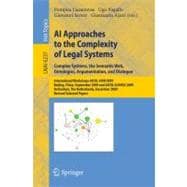
| AI Approaches to the Complexity of Legal Systems | |
| Introduction: Complex Systems and Six Challenges for the Development of Law and the Semantic Web | p. 1 |
| Language and Complex Systems in Law | |
| As Law Goes By: Topology, Ontology, Evolution | p. 12 |
| Sailing the Semantic Seas by Structural Vessels: Problems and Perspectives for the Identification of Implicit Knowledge in the Legal Domain | p. 27 |
| Network Analysis of the French Environmental Code | p. 39 |
| Model Regularity of Legal Language in Active Modifications | p. 54 |
| Ontologies and the Representation of Legal Knowledge | |
| Traceability and Change in Legal Requirements Engineering | p. 74 |
| When a FrameNet-Style Knowledge Description Meets an Ontological Characterization of Fundamental Legal Concepts | p. 93 |
| Application of an Ontology-Based Model to a Selected Fraudulent Disbursement Economic Crime | p. 113 |
| Multi-layer Markup and Ontological Structures in Akoma Ntoso | p. 133 |
| Argumentation and Logics | |
| Prescriptive and Descriptive Obligations in Dynamic Epistemic Deontic Logic | p. 150 |
| Lex Minus Dixit Quam Voluit, Lex Magis Dixit Quam Voluit: A Formal Study on Legal Compliance and Interpretation | p. 162 |
| Dialogue and Legal Multimedia | |
| Legal Electronic Institutions and ONTOMEDIA: Dialogue, Inventio, and Relational Justice Scenarios | p. 184 |
| Mediation, ODR, and the Web 2.0: A Case for Relational Justice | p. 205 |
| Legal ôNeutral Dialogueö, Implementing the Work of Bruce Ackerman in the Field of Law | p. 217 |
| Legal Multimedia Management through JPEG2000 Framework | p. 229 |
| Author Index | p. 243 |
| Table of Contents provided by Ingram. All Rights Reserved. |
The New copy of this book will include any supplemental materials advertised. Please check the title of the book to determine if it should include any access cards, study guides, lab manuals, CDs, etc.
The Used, Rental and eBook copies of this book are not guaranteed to include any supplemental materials. Typically, only the book itself is included. This is true even if the title states it includes any access cards, study guides, lab manuals, CDs, etc.